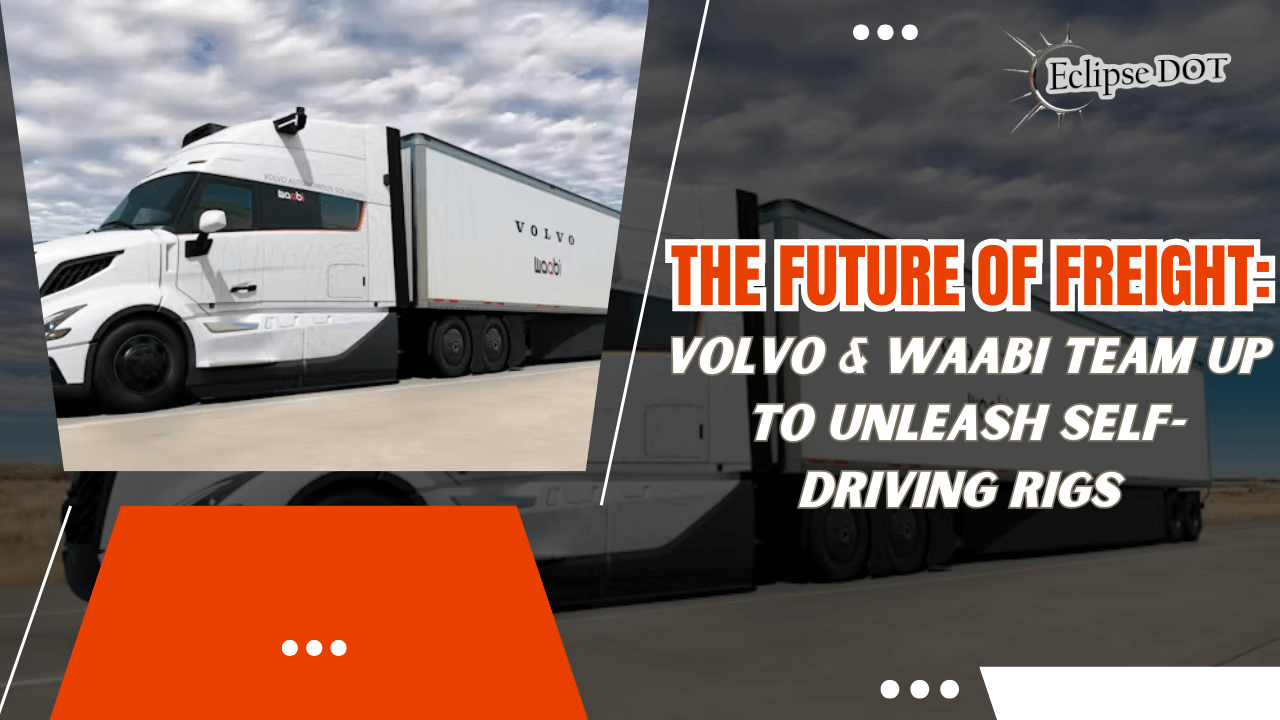For years, autonomous trucking has been the stuff of futuristic headlines—something always just around the corner but never quite rolling onto the highway. But now, that’s changing. Volvo Autonomous Solutions and Waabi have officially joined forces to bring self-driving trucks to the real world, and this time, they mean business.
Forget prototypes and limited test runs—this long-term strategic partnership is about deploying autonomous big rigs at scale, solving real industry problems, and making AI-powered freight hauling a reality.
With Waabi’s next-gen AI driving system and Volvo’s world-class automation platform, this collaboration is tackling some of the biggest challenges in trucking today, from driver shortages to efficiency gaps.
So, what does this mean for the industry? Buckle up—because the future of freight is shifting into high gear.
Why This Partnership Is a Game-Changer for Trucking
Autonomous trucking isn’t a new idea. Companies have been testing self-driving technology for years, but most efforts have stalled before reaching commercial viability.
Here’s why Volvo and Waabi’s partnership is different:
🔹 Waabi’s AI is next-level. Instead of relying solely on real-world road testing (which takes years), Waabi Driver is trained in a hyper-realistic AI simulator. This lets it drive millions of virtual miles and learn from scenarios before ever hitting the pavement.
🔹 Volvo’s trucks are built for autonomy. The VNL Autonomous truck isn’t just a regular semi with some sensors slapped on—it’s designed from the ground up for self-driving operation, with redundant safety systems built-in.
🔹 It’s not just an experiment—it’s a commercial strategy. Volvo and Waabi aren’t just testing a handful of trucks. They’re building an autonomous fleet for real-world deployment, tackling freight routes that are already moving goods across America.
What This Means for Fleets & Freight Operators
For trucking companies and logistics providers, this partnership isn’t just about cool tech—it’s about solving real, billion-dollar problems.
✔️ Driver Shortages? AI Has No Hours of Service Limits.
The trucking industry faces a massive driver shortage, with an estimated 80,000+ positions unfilled. Autonomous trucks don’t get tired, don’t need breaks, and can run 24/7.
✔️ Lower Operating Costs & Increased Efficiency
Fuel prices, wages, and insurance costs are sky-high. By automating long-haul routes, fleets could see major cost reductions while increasing freight capacity.
✔️ Improved Safety & Fewer Accidents
Human error is responsible for 94% of all traffic accidents. AI-driven trucks don’t get distracted, don’t speed, and never drive fatigued. Volvo’s self-driving platform is designed to prevent accidents before they happen.
✔️ Scalability for the Future of Freight
This isn’t just a one-off deployment. Volvo and Waabi are building an infrastructure to expand self-driving freight operations across the U.S., with real testing beginning in 2025.
What’s Under the Hood? How Volvo & Waabi Are Making This Work
Let’s talk about the technology that’s making this possible.
Meet the Waabi Driver: AI That Actually Learns
🔹 A Self-Driving System That Thinks Like a Human
Most self-driving trucks rely on pre-programmed rules, meaning they struggle in unexpected scenarios. Waabi Driver is different. It uses an end-to-end AI model that learns and adapts in real time.
🔹 Millions of Miles in a Virtual World
Before any Waabi-powered truck touches real pavement, it first drives through millions of simulated miles in a neural AI environment. This allows it to experience every possible road hazard, weather condition, and traffic situation—all without risking a real-world crash.
🔹 Smarter, Faster, Safer
Because it learns in a simulator, Waabi’s AI develops faster and more safely than traditional self-driving systems. It’s designed to handle unpredictable road situations—without relying on expensive real-world testing.
The Volvo VNL Autonomous: A Self-Driving Truck Built for the Long Haul
🔹 Redundant Safety Systems – Because failure isn’t an option, the truck has multiple backup systems for braking, steering, and navigation.
🔹 Purpose-Built for Automation – Unlike retrofitted trucks, this model was designed from day one for autonomous driving.
🔹 Scalable for Real Freight Operations – It’s not just a tech demo—this truck is being built for widespread commercial use.
Volvo & Waabi: A Partnership Years in the Making
This collaboration didn’t happen overnight. Volvo has been investing in Waabi since 2023, including backing the $200M Series B funding round that helped fuel Waabi’s AI-driven trucking technology.
Now, after years of research and development, they’re ready to take the next step: full-scale deployment.
The Roadmap to Fully Autonomous Freight Operations
🚛 2025: First real-world tests begin on freight routes across the U.S.
🚛 Initial deployment will focus on long-haul operations—where AI trucks have the biggest advantage.
🚛 Expansion into fleet-wide autonomous operations, scaling up self-driving trucks for widespread adoption.
And it’s not stopping there. Waabi is already laying the groundwork for the future of AI-driven freight logistics.
🚛 They’ve opened an 8-acre autonomous trucking terminal in Lancaster, TX, to serve as a hub for self-driving freight.
🚛 They’ve been hauling real freight loads autonomously through their partnership with Uber Freight.
🚛 They’re expanding beyond just trucking, with future AI applications in robotaxis and even humanoid robotics.
The Bigger Picture: What This Means for the Industry
1. The Dawn of AI-Driven Freight
This is one of the biggest moves in self-driving trucking history. If successful, Volvo & Waabi’s fleet could set the standard for AI-powered freight operations worldwide.
2. The End of Driver Shortages? Maybe Not Yet.
While self-driving trucks will handle long-haul routes, humans will still be needed for last-mile deliveries, complex routes, and fleet operations. This isn’t about replacing drivers—it’s about solving critical gaps in capacity.
3. The Future of Trucking Is Now a Reality
For years, self-driving trucks felt like a far-off dream. But with real deployments coming in 2025, this isn’t science fiction anymore—it’s happening.
Final Thoughts: Are You Ready for AI-Powered Big Rigs?
Autonomous trucking is no longer just a possibility—it’s an inevitability.
With Volvo & Waabi leading the charge, the trucking industry is on the verge of a historic transformation. The question isn’t if self-driving trucks will take over freight highways—it’s when.
Gain exclusive access to our CDL & DOT Compliance articles with a trial at DOTDocs.com. And don’t forget to claim your FREE micro audit at THE ECLIPSE DOT MICRO AUDIT. Ready for seamless operations? Discover the difference today!
Sources & Additional Reading:
🔗 Reuters: Waabi & Volvo Team Up on Self-Driving Trucks
🔗 Waabi: Official Announcement on Volvo Partnership
🔗 Waabi’s Lancaster, TX Autonomous Trucking Terminal


